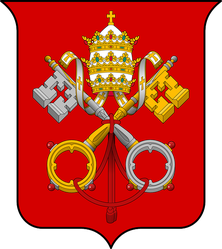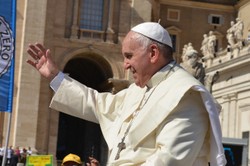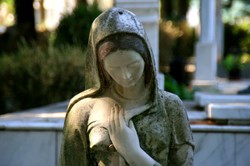The Power and the Glory is set in Mexico in the pre-war period, when President Calles' atheist and secularist government was wreaking its murderous persecution of Catholicism, in which churches were closed and many priests driven out, imprisoned or killed.
The book is like layers of an orange. Initially we read a small section describing how a cynical journalist sitting in his hotel room overlooks a small and timid man being lined up before a firing squad. The next layer consists of an account of a Catholic mother reading her daughters and son a hagiographical account of a priest martyred in the persectuions. Then the deeper story begins when we read of a small and somewhat inconspicuous man seeking bread and wine, at a time when wine was forbidden by the teetotal government. We know that this is the small man whose execution is happening in the town square, and we know that he seeks these items to consecrate at mass.
There are four villains who dog the priest throughout the tale. The Mestizo is a Satanic figure bent on gaining the reward for capturing the priest. He knows who the priest is, but is too weak to arrest him, so he must bide his time and set a trap. The lieutenant is a sincere atheist bent on arresting the priest, as he disbelieves in religion. There is also the Gringo bandit, wanted by the authorities, he shows no interest in the priest, but his fate is wound up with the priest's. There is also the failed priest, Father Jose, who has taken a bribe to abandon his faith. Greene's scorn for this character comes through in the book, as he depicts a man cowardly and degraded, who has fallen from faith and wisdom, and whom no one respects.
The priest, who like most characters in the novel is never named, is a stumbling inadequate. He has remained faithful to his mission. While wanting to run away someone's spiritual need always calls him to stay. Yet he is lonely and drinks too much brandy, and one night when drunk he sired a child, leading him to regret his fall from priestly standards. Yet he never betrays his mission. It is this that leads him to his doom.
Having escaped to Guatemala he is ready to say mass when the Mestizo arrives. The ,message is that the Gringo bandit has been wounded and captured, and is pleading for a priest before he dies. Without absolution from a priest he will die unshriven. The priest suspects a trap, but faithful to his ministry he returns with the Mestizo, to find the bandit unrepentant and the lieutenant waiting. The priest is finally taken, the lieutenant gets his prey and the Mestizo his reward. There is only one fate: execution.







 Darkness over the Earth the skies darkened when Jesus was crucified23 days ago
Darkness over the Earth the skies darkened when Jesus was crucified23 days ago
 TheThousand Year Gardenon 11/26/2025
TheThousand Year Gardenon 11/26/2025
 Women of the Gospelson 10/11/2025
Women of the Gospelson 10/11/2025
 Religious Gardenson 08/25/2025
Religious Gardenson 08/25/2025




Comments
What is new I believe is the focus on forgiveness that characterises Jesus' mission.
Thank you!
Jesus Christ assuring us of the sufficiency of "I'm sorry, God" intrigues me in its ease, effectiveness and efficiency.
Did expressing sorry-ness fit in with ancient or arising religions and spiritualnesses of His time or was Jesus Christ injecting, inventing something new?
I believe it to be so. Jesus never demanded confession from anyone..He simply wanted repentance. I like the Anglican teaching on confession,, all may, none must, some should.
Thank you!
It's interesting that a priest does not have to make and respond to his own confession, Last Rites or simple "I'm sorry" to God.
Non-priests may baptize. Would it be sufficient for any non-priest to say "I'm sorry"?
He could just say sorrybton God. Jesus neverbdemanded or ordered that anyone confess anything.
The next-last heading, Execution and afterwards, apprises us of a priest whose confession does not get heard by another priest.
Is it possible for a priest in such a situation to hear and respond to his confession and to implement his own Last Rites?
I think that this is an American saying.
Your last sentence, about saints and sinners falling down and picking themselves up, calls to mind a saying here.
The saying goes that fall down, pick yourself up seven times or fall down, pick yourself up eight times. There is actually a controversy over which one is the original and which one makes the most sense!
Would that saying exist on your, eastern (Atlantic) pond side?
The message of the Power and the Glory is that humans are flawed beings with the capacity to reach for the infinite, but our lives are messy. We have urges that drag us down. The only response is to keep on pressing and don't fall into despair. Note that in the book the priest dies thinking himself a failure, but he was unaware that the boy had been inspired by him.
The New Testament sets a standard of perfection that is above us all, that' the message of the Sermon on the Mount, one of whose passages you cite. But God simply wants to draw us forward, we will never reach that standard of perfection, but that's why forgiveness is so important.
Indeed, many saint have picked themselves up. Peter after the denials of Jesus and Paul who served Rome before being struck with a bolt. And, if these great saints were able to do so, certainly the others could. Interesting and profound.